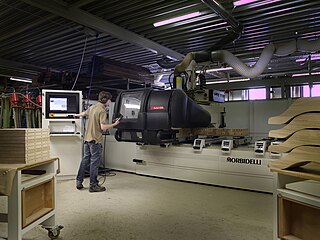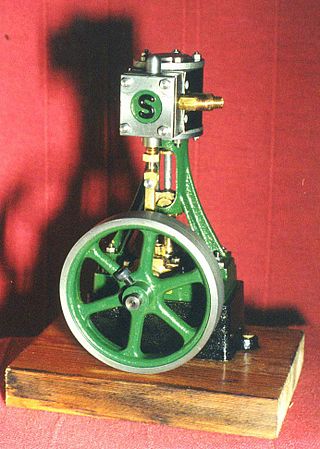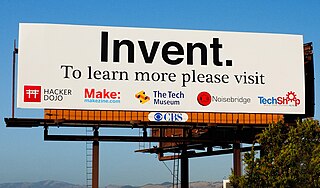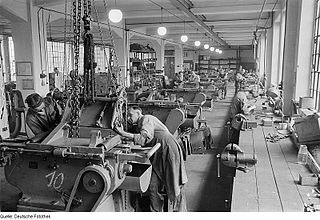
A lathe is a machine tool that rotates a workpiece about an axis of rotation to perform various operations such as cutting, sanding, knurling, drilling, deformation, facing, and turning, with tools that are applied to the workpiece to create an object with symmetry about that axis.

A factory, manufacturing plant or a production plant is an industrial facility, often a complex consisting of several buildings filled with machinery, where workers manufacture items or operate machines which process each item into another. They are a critical part of modern economic production, with the majority of the world's goods being created or processed within factories.

A craft or trade is a pastime or an occupation that requires particular skills and knowledge of skilled work. In a historical sense, particularly the Middle Ages and earlier, the term is usually applied to people occupied in small scale production of goods, or their maintenance, for example by tinkers. The traditional term craftsman is nowadays often replaced by artisan and by craftsperson.

In machining, a shaper is a type of machine tool that uses linear relative motion between the workpiece and a single-point cutting tool to machine a linear toolpath. Its cut is analogous to that of a lathe, except that it is (archetypally) linear instead of helical.

Metalworking is the process of shaping and reshaping metals to create useful objects, parts, assemblies, and large scale structures. As a term it covers a wide and diverse range of processes, skills, and tools for producing objects on every scale: from huge ships, buildings, and bridges down to precise engine parts and delicate jewelry.

A machinist is a tradesperson or trained professional who operates machine tools, and has the ability to set up tools such as milling machines, grinders, lathes, and drilling machines.

In machining, numerical control, also called computer numerical control (CNC), is the automated control of tools by means of a computer. It is used to operate tools such as drills, lathes, mills, grinders, routers and 3D printers. CNC transforms a piece of material into a specified shape by following coded programmed instructions and without a manual operator directly controlling the machining operation.

Model engineering is the pursuit of constructing proportionally-scaled miniature working representations of full-sized machines. It is a branch of metalworking with a strong emphasis on artisanry, as opposed to mass production. While now mainly a hobby, in the past it also had commercial and industrial purpose. The term 'model engineering' was in use by 1888. In the United States, the term 'home shop machinist' is often used instead, although arguably the scope of this term is broader.

A machine shop or engineering workshop is a room, building, or company where machining, a form of subtractive manufacturing, is done. In a machine shop, machinists use machine tools and cutting tools to make parts, usually of metal or plastic. A machine shop can be a small business or a portion of a factory, whether a toolroom or a production area for manufacturing. The building construction and the layout of the place and equipment vary, and are specific to the shop; for instance, the flooring in one shop may be concrete, or even compacted dirt, and another shop may have asphalt floors. A shop may be air-conditioned or not; but in other shops it may be necessary to maintain a controlled climate. Each shop has its own tools and machinery which differ from other shops in quantity, capability and focus of expertise.

Tool and die makers are highly skilled crafters working in the manufacturing industries. Variations on the name include tool maker,toolmaker, die maker,diemaker, mold maker,moldmaker or tool jig and die-maker depending on which area of concentration or industry an individual works in.

A planer is a type of metalworking machine tool that uses linear relative motion between the workpiece and a single-point cutting tool to cut the work piece. A planer is similar to a shaper, but larger, and with workpiece moving, whereas in a shaper the cutting tool moves.

Ironmongery originally referred, first, to the manufacture of iron goods and, second, to the place of sale of such items for domestic rather than industrial use. In both contexts, the term has expanded to include items made of steel, aluminium, brass, or other metals, as well as plastics.

A hackerspace is a community-operated, often "not for profit", workspace where people with common interests, such as computers, machining, technology, science, digital art, or electronic art, can meet, socialize, and collaborate. Hackerspaces are comparable to other community-operated spaces with similar aims and mechanisms such as Fab Lab, men's sheds, and commercial "for-profit" companies.

Solid surface is a man-made material usually composed of a combination of alumina trihydrate (ATH), acrylic, epoxy or polyester resins and pigments. It is most frequently used for seamless countertop installations.

The maker culture is a contemporary subculture representing a technology-based extension of DIY culture that intersects with hardware-oriented parts of hacker culture and revels in the creation of new devices as well as tinkering with existing ones. The maker culture in general supports open-source hardware. Typical interests enjoyed by the maker culture include engineering-oriented pursuits such as electronics, robotics, 3-D printing, and the use of computer numeric control tools, as well as more traditional activities such as metalworking, woodworking, and, mainly, its predecessor, traditional arts and crafts.

The Eveleigh Railway Workshops is a heritage-listed former New South Wales Government Railways yards and railway workshops and now venue hire, public housing and technology park located at Great Southern and Western railway, Redfern, City of Sydney, New South Wales, Australia. It was designed by George Cowdery and built from 1882 to 1897 by George Fishburn. It is also known as Eveleigh Railway Yards, South Eveleigh Precinct; North Eveleigh; Macdonaldtown Gasworks; Macdonaldtown Triangle and also by the name of its current occupants, Carriageworks. The property is owned by the Transport Asset Holding Entity, an agency of the Government of New South Wales. It was added to the New South Wales State Heritage Register on 2 April 1999. The workshops are considered to have world heritage significance by curators of the Smithsonian Institution.

The machine industry or machinery industry is a subsector of the industry, that produces and maintains machines for consumers, the industry, and most other companies in the economy.

A machine factory is a company, that produces machines. These companies traditionally belong to the heavy industry sector in comparison to a more consumer oriented and less capital intensive light industry. Today many companies make more sophisticated smaller machines, and they belong to the light industry. The economic sector of machine factories is called the machine industry.

North Ipswich Railway Workshops is a heritage-listed former Australian railway workshop at North Street, North Ipswich, Queensland. It was built from 1878 to 1980s. It is also known as the Workshops Rail Museum. It was added to the Queensland Heritage Register on 21 April 1997.

Zaporizhzhia Foundry and Mechanical Plant is an enterprise of the metallurgical industry in the city of Zaporizhzhia, of Zaporizhzhia Oblast, Ukraine.





















